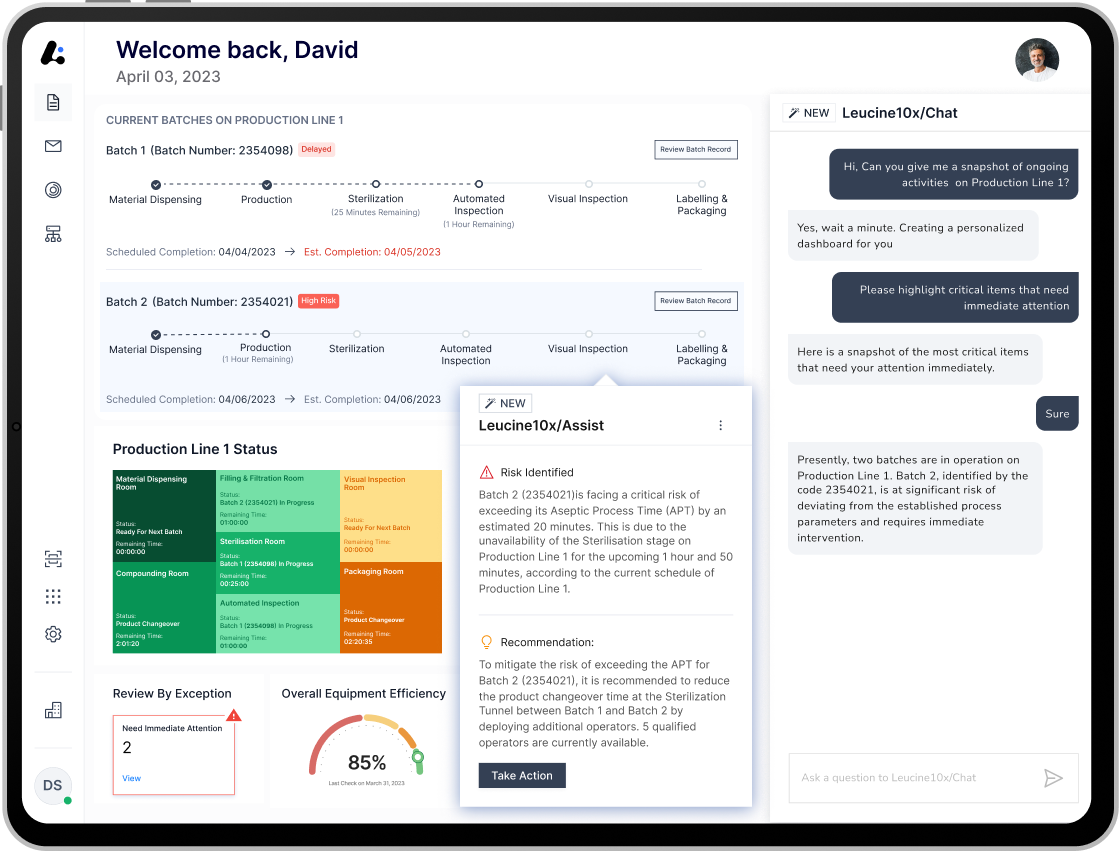The compliance process at pharmaceutical manufacturers is complicated because many still use paper-based systems to record manufacturing steps. These paper records are reviewed by FDA auditors to ensure that guidelines were followed, but they are prone to errors, often leading to warnings. This results in higher costs and slower manufacturing. Leucine wants to make the compliance process more efficient with its compliance cloud platform for the pharmaceutical industry. It automatically creates digital manufacturing records and uses AI to identify the root cause of deviations.
New York-based Leucine announced today it has raised a $7 million Series A led by strategic investor Ecolab Inc. Participants include returning investors like Pravega Ventures, Axilor Ventures, Techstars and angel investors. Founded in 2019, Leucine is currently used by over 30 companies in more than 300 pharmaceutical manufacturing facilities in 10 countries, including the U.S., India, Brazil, Mexico and the United Arab Emirates. Its target customers include new biotech firms and pharmaceutical giants.
Leucine describes itself as “a digital twin of the pharma manufacturing shop floor.” It enables real-time performance monitoring and compliance management, analyzes the root cause of deviations from proper operating procedures, gives users advice on how to improve efficiency and creates manufacturing records and audit reports. It can be onboarded in eight weeks because of a proprietary AI-enabled system that digitizes paper SOPs to create custom workflows. Co-founder and CEO Vivek Gera says Leucine can reduce the digitization cycle of a batch cycle from six to eight weeks to just three to five days.
In addition to its funding, Leucine also announced today the beta launch of Leucine 10X, an AI framework that performs specialized tasks like digitizing paper-based SOPs and creating dynamic production plans with production managers to ensure on-time batch delivery. It also makes the root cause analysis of deviations in the manufacturing process faster by analyzing data from text-based records, logs and staff interview transcripts.

Before starting Leucine, Gera worked as a compliance and automation consultant at Fortune 500 companies. He tells TechCrunch that during his work, he realized the scale of non-compliance issues and the impact they were having on bottom lines. For most of his projects, he introduced companies to technology that helped improve compliance.
“However, I noticed that most of the legacy players in this space didn’t offer solutions that brought in compliance by design and moreover didn’t offer any insights to the manufacturers despite hosting vast amounts of data,” he says.
This led to the creation of Leucine. By working with co-founder Mustaq Singh Bijral, whose background is in product management and data science, Gera says Leucine was able to build a data-driven product from day one, with the goal of creating a digital platform that is simple to use and has built-in compliance guidelines and process interlocks that ensure compliance.
Gera says there are legacy compliance systems that also offer pharmaceutical manufacturing floor digitization, including traditional manufacturing executing systems (MES) like Siemens and Rockwell and newer solutions like MasterControl, Trackwise and Kneat. But he adds that many have very long implementation of cycles, compared to eight weeks for Leucine, which are more difficult to customize and are siloed. They also do not give insights that help prevent potential compliance issues.
Leucine also differentiates from its competitors by using its LLM-based proprietary electronic batch manufacturing record (eBMR) to turn paper SOPs into digital workflows within minutes instead of months. Gera said eBMRs are the most important document in the pharmaceutical manufacturing process because it records every step and is reviewed by FDA auditors to see if manufacturers followed GxP, or quality guidelines.
“Our models have been trained on large volumes of pharma data and enable us to deliver value to our clients quicker than anyone else,” Gera added. “Our platform caters to all use cases on the shop floor, from batch planning to batch release and breaks the data silos, providing a single source of truth.”
Over the last 12 months, Gera says the number of facilities using Leucine has grown by 100%, with a 300% increase in users. This is because facilities are expanding use cases for the platform. It monetizes through a SaaS model with tiered pricing that increases based on volume. Leucine will expand its platforms with more solutions to improve compliance and productivity across the entire pharmaceutical manufacturing ecosystem. It also plans to improve its AI Co-pilot feature.
What’s the best way to run a startup in a world full of advice?































Comment